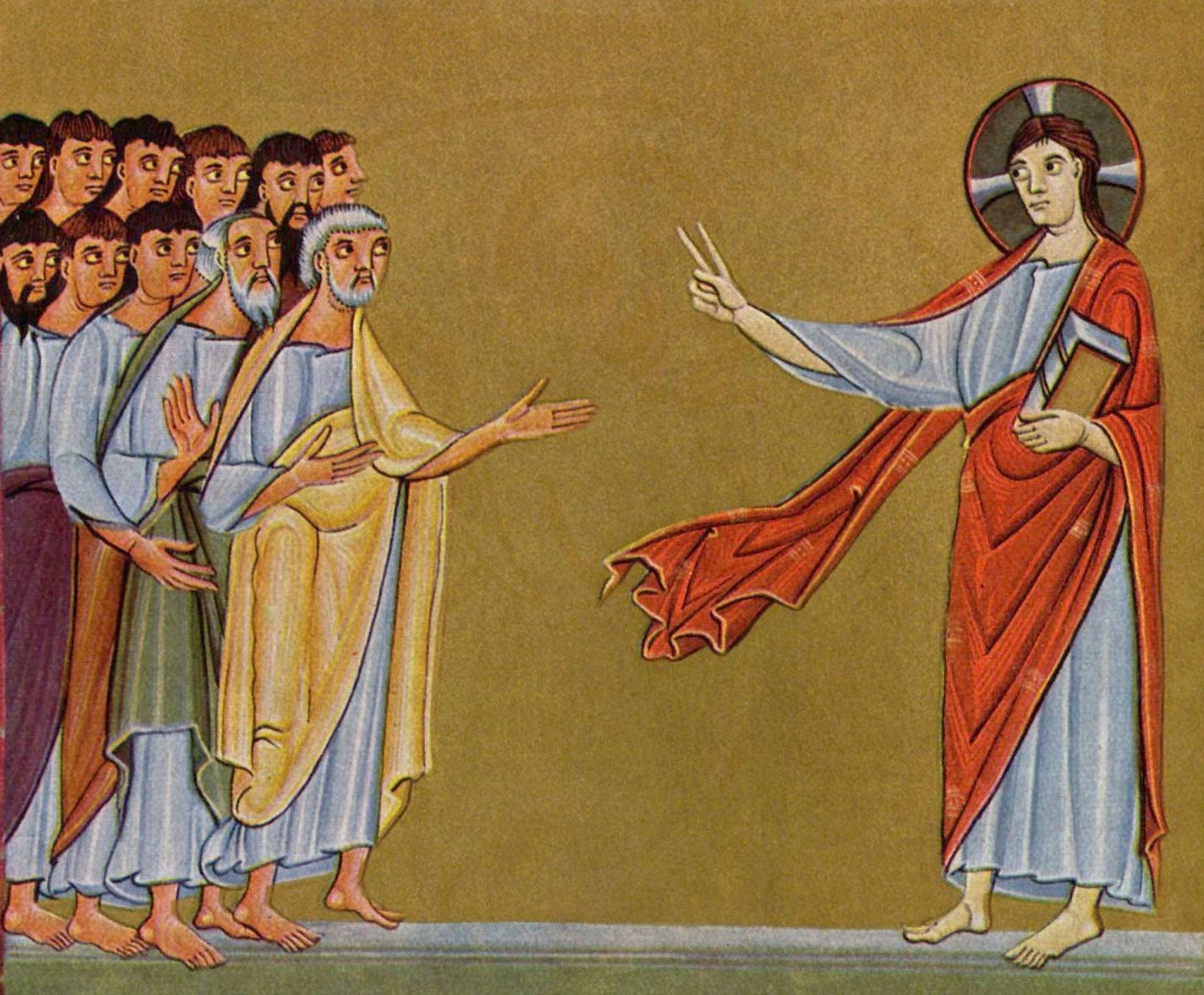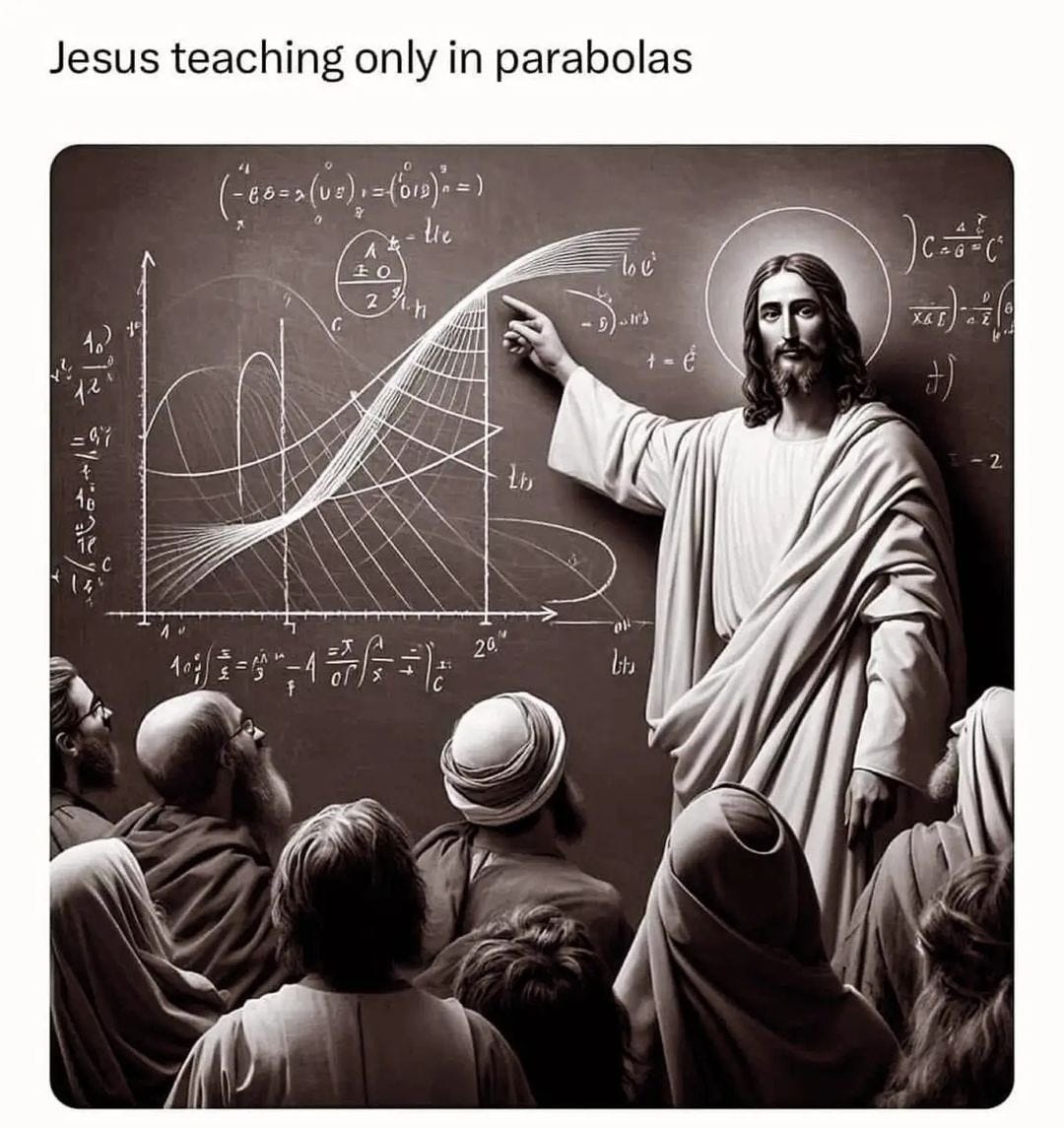Read Along: Why Parables, Jesus? (Mark 10–Luke 15)
We’re Reading the Gospels in September. Here’s the Place to Share What We’re Discovering
Jesus’s preference for teaching with parables—that is, stories or analogies that indirectly communicate ideas—forms a well known feature of the gospels. Having read through Matthew and Mark and more than half of Luke, we’ve bumped into dozens and dozens so far. And since John’s gospel doesn’t really record any parables of its own, you could say we’ve encountered nearly all of them.
Here’s a sampling of what we’ve seen so far—a greatest hits as it were—sorted by first canonical appearance:
The Wise and Foolish Builders (Matthew 7.24–27, Luke 6.47–49)
The Sower (Matthew 13.3–9, Mark 4.3–9, Luke 8.5–8)
The Mustard Seed (Matthew 13.31–32, Mark 4.30–32, Luke 13.18–19)
The Lost Sheep (Matthew 18.12–14, Luke 15.3–7)
The Unmerciful Servant (Matthew 18.23–35)
The Wicked Tenants (Matthew 21.33–46, Mark 12.1–12, Luke 20.9–19)
The Wedding Feast/Banquet (Matthew 22.1–14, Luke 14.16–24)
The Faithful and Evil Servants (Matthew 24.45–51, Luke 12.42–48)
The Talents (Matthew 25.14–30, Luke 19.11–27)
The Good Samaritan (Luke 10.25–37)
The Rich Fool (Luke 12.16–21)
The Barren Fig Tree (Luke 13.6–9)
The Prodigal Son (Luke 15.11–32)
There are others of course, and I’m sure I’m missing one or another that ranks as your personal favorite. How could Joel have missed _____?! Easy. We read with different lenses, different backgrounds, different interests. That’s why I’m eager to hear what you’re finding as we continue to work through the gospels. Don’t forget to share it below!
As for parables themselves, the label comes from the Greek parabolē, which means “to place alongside.” When Jesus wants to say X, he says it’s like Y. But why?
Jesus’s disciples asked him that very question, and here’s his answer:
It has been granted to you to know the secrets of the kingdom of Heaven; but to those others it has not a been granted. For the man who has will be given more, till he has enough and to spare; and the man who has not will forfeit even what he has. That is why I speak to them in parables; for they look without seeing, and listen without hearing or understanding. There is a prophecy of Isaiah which is being fulfilled for them: “You will hear and hear, but never understand; you will look and look, but never see. For this people has grown gross at heart; their ears are dull, and their eyes are closed. Otherwise, their eyes might see, their ears hear, and their heart understand, and then they might turn again, and I would heal them.”
But happy are your eyes because they see, and your ears because they hear! Many prophets and saints, I tell you, desired to see what you now see, yet never saw it; to hear what you hear, yet never heard it (Matthew 13.11–17).
So Jesus teaches in parables, why? In part, to not reveal his message. The parables are not terribly clear even for the disciples. Jesus routinely must interpret and unpack them for his followers. And yet they’re also some of the most memorable passages in the entire Bible. The Sower, Lost Sheep, the Good Samaritan, the Prodigal Son—these stories are both oblique and square on the nose, and they’re part of our cultural inheritance.
Sometimes the meaning is quite clear, and Jesus uses parables to skewer his opposition, particularly the Pharisees and Temple bureaucracy: e.g., “They perceived that he had told this parable against them” (Luke 20.19).
And now the floor is open to you: Please share anything from this week’s reading (or beyond). What did you notice of interest in Mark 10–Luke 15—or any other passage for that matter?
Thanks for reading! If you enjoyed this post, please hit the ❤️ below and share it with a friend.
More remarkable reading is on its way. Don’t miss out. Subscribe for free today.
If you want to read along with the September gospel project, here’s the schedule we’re following. Feel free to adjust it and make it work for you.
Week 1
Sept 3: Matthew 1–3
Sept 4: Matthew 4–6
Sept 5: Matthew 7–9
Sept 6: Matthew 10–12
Sept 7: Matthew 13–15Week 2
Sept 8: Matthew 16–18
Sept 9: Matthew 19–21
Sept 10: Matthew 22–24
Sept 11: Matthew 25–28
Sept 12: Mark 1–3
Sept 13: Mark 4–6
Sept 14: Mark 7–9Week 3
Sept 15: Mark 10–12
Sept 16: Mark 13–16
Sept 17: Luke 1–3
Sept 18: Luke 4–6
Sept 19: Luke 7–9
Sept 20: Luke 10–12
Sept 21: Luke 13–15Week 4
Sept 22: Luke 16–18
Sept 23: Luke 19–21
Sept 24: Luke 22–24
Sept 25: John 1–4
Sept 26: John 5–7
Sept 27: John 8–10
Sept 28: John 11–13Week 5
Sept 29: John 14–17
Sept 30: John 18–21
I’ll be posting a read-along thread every Monday so we can all share what we’re finding as we read. Next week, we’ll cover the rest of Luke and almost half of John. Make sure you leave any thoughts about Mark 10–Luke 15 below.




The blessing of Jesus' contemporaries seeing and hearing what many people in the past had longed to see and hear might seem to indicate that those past righteous people got cheated. Maybe we in our day of fewer miracles and second-hand teaching are also left with unmet desires. But It seems that Jesus places importance on the choice, available to all, to want deeply what only he can do. (Matthew 13:16-17)
On parables, since the reading has not yet reached Luke 16, you haven't included the most mysterious of Jesus' parables, the Parable of the Unrighteous Steward (16.1-8). I have read many explanations of that parable, and none seem to quite fit either the parable or the very oblique explanation by Jesus that follows (16.9-13). But the parable still has a catchphrase that has entered the English language, "the children of this world are in their generation wiser than the children of light".
I've always enjoyed Luke's Gospel narrative, because you can see how his physician's mind, with its scientific discipline for gathering evidence, has approached Jesus' story. Much of his material repeats Matthew's and Mark's accounts, but with subtle tweaks - I get the sense that Luke has spoken to Mary herself, as well as the other women who ministered to Jesus, in the way he includes slight details that Matthew and Mark passed over.